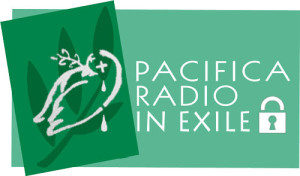Update: As of 11/17, the rumor is not a rumor. KPFA local station board member Sharon Adams as apparently the voice of the “crisis group” released the following document:
kpfa-lsb-dissolution-of-pacifica
The drift seems to be that if the PNB does not either swap out WBAI’s license, transfer KPFA’s broadcast license and 40% of the real estate assets at a fraction of their value and/or allow some unidentified group of “core people” to unilaterally rewrite the foundation bylaws, the authors intend to sue to dissolve the Pacifica Foundation.
Berkeley – A reliable anonymous source has indicated the Berkeley wing of the Siegel/Brazon faction, who refer to themselves as “Save KPFA”, intend to present an offer at the next KPFA local station board meeting on November 19 to pay off Pacifica’s debts (last reported at $4-5 million dollars) and in exchange get KPFA’s broadcasting license transferred to themselves.
It is assumed the transfer would be to the “KPFA Foundation”, the 501(c) 3 established by board member and former IED Margy Wilkinson and corporate counsel Dan Siegel and headquartered at Siegel’s office. The founding articles of the “KPFA Foundation”, which steal the Pacifica mission statement, can be found here. Wilkinson is terming off KPFA’s local station board in December and apparently hopes to take KPFA’s broadcast license with her.
While the details remain to be seen, and it isn’t clear if premature disclosure of the rumored offer will change the timeline, a few things can be said about what is rumored will occur.
KPFA’s broadcast license, which is one of the two in the network that is commercially convertible, can confidently be stated to be worth a minimum of $50 million dollars. KUSF’s former 3,000 watt transmitter in the San Francisco Bay Area (the former cutting edge alternative station that now plays classical music) was sold for $3.75 million dollars in 2011. KPFA’s license is 59,000 watts or 20 times the wattage. The Berkeley assets also include three buildings on Martin Luther King Jr Way (#1923, #1925 and #1929. #1929 contain’s KPFA’s broadcast studio), a transmitter site in the hills above Berkeley, the smaller KPFB-FM license, and two translator stations in Bonny Doon and Oakley. The station may have also set up a third translator station in Santa Cruz.

Whatever may or may not be included, the offer would appear to be for no more than 1/10 the value of the assets and possibly considerably less. When board members attempt to secure the assets of nonprofit organizations at a fraction of their value, such deals are usually labeled as self-dealing transactions.
The remaining Pacifica Foundation, after such a deal, would be a network of 4 major market radio stations, a national headquarters, an archival collection, and the program service Audioport which serves about 200 community radio stations across the country via the affiliates program. It would not be expected to be able to sustain itself going forward due to the loss of 32% of its income and deficit operations at most of its divisions. It’s also not clear a new KPFA could sustain itself, given the need to hire additional administrative staff and vendors for audit services, payroll administration, additional insurance and tax preparation, among other needs. KPFA operated at a deficit for much of 2016 and finally moved its entire October fund drive a month forward into September due to financial pain that had the general manager declaring the station on the verge of collapse a few months ago.
The offer is said to have been disclosed at an informal group that calls itself the “crisis group”, which is self-appointed and includes some members of the current local station board, some KPFA paid staff members, and a few selected listeners. The group meets privately and does not disclose the contents of their discussions or report back to any member-elected KPFA or Pacifica body. The meetings are not open to the public or uninvited KPFA members and do not release minutes. The group’s only known previous activity was a 2015 civility pledge signed by a mere two dozen people across the country (a few of whom signed in jest).
In general, Pacifica in Exile prefers not to publish materials that cannot be definitively substantiated at the time of release, but given the gravity of this matter to the future of all of the Pacifica stations, we are making an exception since all Pacifica members have the right to know if such an offer is in the making, as all would be affected by it. The KPFA local station board has no power to dispose of foundation assets, but presumably the idea of presenting at the Saturday meeting is to have the Siegel/Brazon board majority formally recommend it to the national board of directors, despite the financial paucity of the offer. Pacifica’s bylaws indicate that such a significant transfer of assets would have to put to an up or down vote of the Pacifica membership nationwide.
What would a privatized KPFA look like? Should the transfer occur, leaving aside the fates of the other Pacifica stations, archives and affiliates program, the new KPFA would likely dispense with most of the reforms instituted after 1999 and revert to a more traditional nonprofit industry structure with a self-appointed board and less stringent public participation requirements. It is not known if the new organization would apply for Corporation for Public Broadcasting funds, so it may exempt itself from that body’s open meeting requirements which form the basis for Pacifica’s own. Community advisory boards and program councils, both manifestations of Pacifica’s attempts at democratic participation, as well as the unpaid staff organization, might all cease to exist along with member and staffer voting rights. It is not known if the new organization would be unionized, if the apprenticeship program would be maintained or what the ratio of paid to volunteer-produced programming or music to public affairs programming, would be after the transition. Members would revert to donor status with no commensurate rights regarding the new organization’s bylaws, structure, or activities beyond choosing to donate – or not.

Such a fate would be an ironic end to the Pacifica democratic experiment, which was foisted on a somewhat reluctant national network after KPFA initiated a rebellion in 1999 following the firing of former general manager Nicole Sawaya. Local lawsuits, including one by the then-KPFA-local-board demanding the power to select national board representatives and a “listener lawsuit” demanding the California Attorney General provide voting rights to the station’s donors, eventually toppled Pacifica’s self-selected board of directors some time after a 50-day standoff in front of the station brought the City of Berkeley to a virtual halt in the summer of 1999.
Demands for the transformation of the station into a more diverse and community-based operation drove the protests and lawsuits. Such demands remain somewhat unmet, although a few of the innovations including the creation of Hard Knock Radio, the entry of several programs via the program council including Voices of the Middle East and North Africa, Guns and Butter, and the Women’s Magazine, and Morning Mix refugees the Project Censored Show, A Rude Awakening, Work Week and El Show de Andres Soto remain staples of the current program grid.
The move to secede from Pacifica by the Berkeley Siegel-Brazonites follows the faction’s March 2014 board coup by about two and a half years. Since then, 7 of the board’s 12 officer positions (chair, vice-chair, secretary and treasurer) have been filled by members of KPFA’s local station board, representing more than twice the dominance of any other station in the leadership of the national Pacifica board. (The next nearest is WPFW with 3 of the 12). Many of the problems anticipated in an attorney general complaint originally filed in March of 2014 by 8 former Pacifica board members, including the loss of directors and officers liability insurance, the loss of millions of dollars in Corporation for Public Broadcasting grants, labor troubles and the failure to complete timely financial audits came to pass as predicted under the leadership of the faction’s Margy Wilkinson and successor volunteer ED Lydia Brazon. The faction now reportedly seeks to secede from, essentially, itself. At a 90% discount.
A timeline of the now more than two year old coup by the Siegel/Brazon faction can be seen here.
KPFA’s November 19th board meeting will be held at the North Berkeley Senior Center at Hearst and Martin Luther King Jr Way in Downtown Berkeley beginning at 11:00am.
**
If you value being kept up to speed on Pacifica Radio news via this newsletter, you can make a little contribution to keep Pacifica in Exile publishing. Donations are secure, but not tax-deductible. (Scroll down to the donation icon).
Pacifica in Exile readers may write to the board at pnb@pacifica.org.
For readers who may wish to do more, any donor to a California-based not for profit organization like Pacifica may file a complaint to the open file at the Registry of Charitable Trusts at the Office of the CA Attorney General. Pacifica’s case number is CT011303. An email template can be found here.
To subscribe to this newsletter, please visit our website at www.pacificainexile.org
###
Started in 1946 by conscientious objector Lew Hill, Pacifica’s storied history includes impounded program tapes for a 1954 on-air discussion of marijuana, broadcasting the Seymour Hersh revelations of the My Lai massacre, bombings by the Ku Klux Klan, going to jail rather than turning over the Patty Hearst tapes to the FBI, and Supreme Court cases including the 1984 decision that noncommercial broadcasters have the constitutional right to editorialize, and the Seven Dirty Words ruling following George Carlin’s incendiary performances on WBAI. Pacifica Foundation Radio operates noncommercial radio stations in New York, Washington, Houston, Los Angeles, and the San Francisco Bay Area, and syndicates content to over 180 affiliates. It invented listener-supported radio.



also see part of same posting at : http://la.indymedia.org/news/2016/11/294278.php